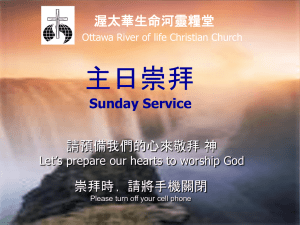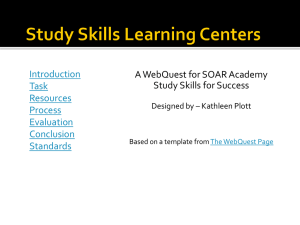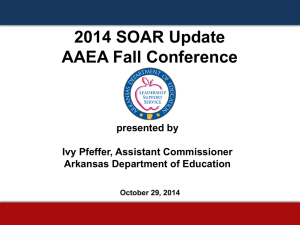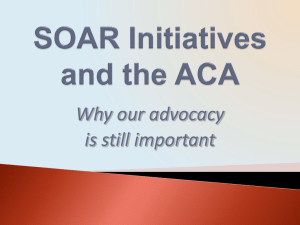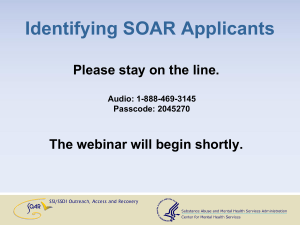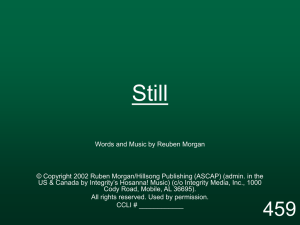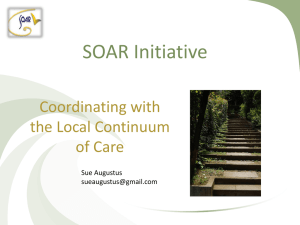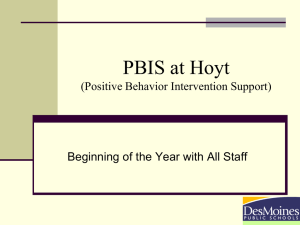PowerPoint Slides - SOAR Works!
advertisement
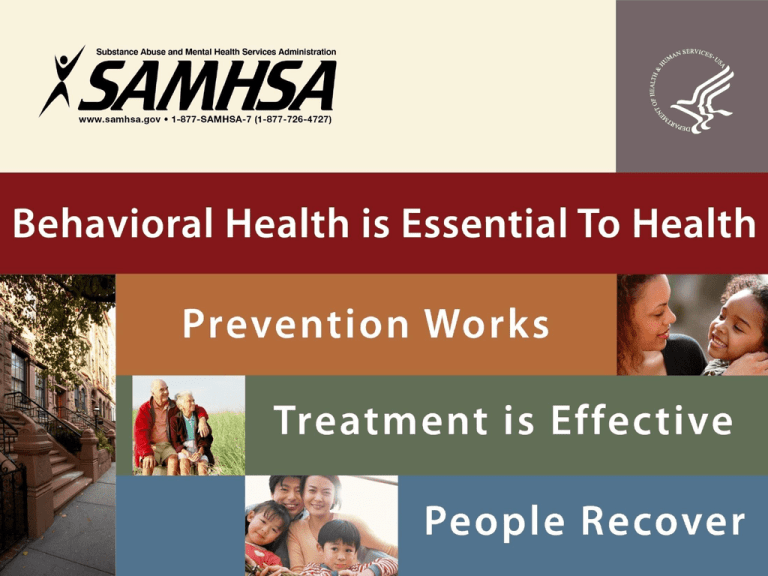
Innovative Strategies to Fund SOAR Programs SAMHSA’s Homeless and Housing Resource Network (HHRN) Webinar Wednesday, February 4, 2015 2:00-3:30 p.m. ET Presenters • Kristin Lupfer, M.S.W., Project Director, SOAR Technical Assistance (TA) Center • Emily Carmody, LCSW, Project Specialist, North Carolina Coalition to End Homelessness • Peter J. Pike, Executive Director, Colorado Disability Benefits Support Program (DBS) 3 • • 4 This training is supported by the Substance Abuse and Mental Health Services Administration (SAMHSA) and the U.S. Department of Health and Human Services (DHHS). The contents of this presentation do not necessarily reflect the views or policies of SAMHSA or DHHS. The training should not be considered a substitute for individualized client care and treatment decisions. SOAR Funding Strategies SSI/SSDI Outreach, Access, & Recovery SAMHSA SOAR Technical Assistance Center Sponsored By: Substance Abuse And Mental Health Services Administration U.S. Department Of Health And Human Services Kristin Lupfer Project Director SAMHSA SOAR TA Center (518) 439-7415 x5262 klupfer@prainc.com 5 Funding SOAR Programs There is no dedicated source of federal funding for SOAR programs Yet, all 50 states participate! Reallocating existing resources Securing funding through federal and state grants and foundation funding Establishing collaborations with hospitals and criminal justice settings 6 Create a Funding Framework Know your “ask” Explore potential resources Create a funding action plan Who, what, when, how Record and revisit responses Market your program Develop an elevator pitch Show value for money 7 Federal Funding: SAMHSA Projects for Assistance in Transition from Homelessness (PATH) Similar components: outreach, engagement, assessment, documentation, recovery PATH funds support dedicated SOAR benefits specialists, SOAR training, and statewide leadership and coordination in many states Encourage your State PATH Contact to include SOAR activity in PATH contracts 8 Federal Funding: SAMHSA Community Mental Health Services Block Grant (MHBG) Cooperative Agreements to Benefit Homeless Individuals (CABHI) Olmstead Adult Treatment Drug Courts 9 Federal Funding: HUD Community Development Block Grant (CDBG) A flexible program that provides communities with resources to address unique community development needs Distributes annual grants on a formula basis to local governments and states SOAR programs have used these funds to support dedicated benefits specialists 10 Federal Funding: VA/SSVF Supportive Services for Veteran Families (SSVF) July 2014 survey: SSVF grantees are involved in SOAR in 44 of 52 states and territories 146 of the 319 individual SSVF grantees are actively using SOAR Services include increasing access to mainstream benefits Notice of funding includes the expectation that grantees will use the SOAR model through community linkages or staff training Many grantees have amended their budgets to support a dedicated SOAR benefits specialist 11 Federal Funding: AmeriCorps AmeriCorps State Provide direct outreach, engagement, and assistance with SSI/SSDI applications A cash or in-kind match is required for program costs Apply for a grant through your governorappointed State Service Commission www.nationalservice.gov 12 Federal Funding: AmeriCorps VISTA AmeriCorps VISTA Can identify potential SOAR collaborations, organize local SOAR planning meetings, fundraise for dedicated SOAR staff, collect data, and coordinate future trainings Apply through your state Corporation for National and Community Service office No required funding match from sponsors, but there is a cost-share option SOAR TA Center issue brief on AmeriCorps 13 Medicaid and State Health Programs Medicaid is a state-operated program, federal and state share the cost State creates a plan for what services are billable Case management services necessary for SOAR applications may be billable or allowable services Tennessee: Behavioral Health Safety Net providers can bill for SOAR application assistance Georgia: Six regional positions statewide for Medicaid Eligibility Specialists 14 State or County General Assistance (GA) GA funds offer time-limited cash benefits to adults without dependents who have limited or no income These benefits are not available in every state Through an Interim Assistance Reimbursement (IAR) agreement, the Social Security Administration (SSA) can reimburse state or local public assistance funds when individuals begin receiving SSI 15 State or County Temporary Assistance for Needy Families (TANF) TANF is a block grant from the U.S. Department of Health and Human Services Provides time-limited assistance to families with dependent children to help them become self-sufficient through employment For parents who cannot meet the TANF work requirements, SSI/SSDI may meet their needs and save state funds 16 State/Local Plans to End Homelessness Most plans to end homelessness incorporate increasing access to mainstream benefits Can fund SOAR leadership, coordination, and dedicated benefits specialists Find your local plan and promote how SOAR helps meet this goal Nashville, Tennessee: 10-year plan funds three positions in community mental health center Since May 2006, SOAR providers in Nashville achieved a 98% approval rate for 692 applications; in 2014, they averaged 37 days to decision 17 Foundation & Other Private Funding United Way: Funds coordination of SOAR in Trenton, New Jersey, and staffing of SOAR programs in other localities Pharmaceutical and insurance companies: GlaxoSmithKline, Blue Cross Blue Shield, and Kaiser Permanente fund SOAR programs in North Carolina and Oregon www.foundationcenter.org 18 Hospital Collaborations Hospitals can recoup payments for previously uncompensated care when individuals approved for SSI obtain Medicaid SOAR providers may receive funding from hospitals for dedicated SOAR benefits specialists to help individuals access SSI/SSDI and health insurance In 2014, states reported an average $10,465 reimbursed from Medicaid per SOAR approval SOAR TA Center issue brief on hospital collaborations 19 Criminal Justice System Collaborations Diversion courts, in-reach initiatives, re-entry planning, and SOAR-trained corrections staff Reduces recidivism, prevents incarceration, saves money In 2009, the Miami-Dade Jail Diversion Program estimated cost-savings to the state of $7 million Results leveraged ongoing funding for SOAR In 2014: 260 applications, 91% approval rate in 28 days 20 Other Partnerships Programs serving targeted groups Veterans Youth leaving foster care Local colleges and universities Social work field placements or internships Students get experience working with clients and help grow an agency’s SOAR program Peer support organizations SOAR TA Center issue brief on utilizing peer support workers with SOAR 21 Growing & Sustaining SOAR Be creative Use your outcomes Share success stories with the press Give presentations to potential funders Create linkage with influential leaders—both private and public Keep persisting! 22 https://soarworks.prainc.com 23 For More Information on SOAR Visit our website: http://soarworks.prainc.com SAMHSA SOAR TA Center 345 Delaware Avenue Delmar, New York 12054 (518) 439 – 7415 soar@prainc.com www.facebook.com/soarworks @SOARWorks 24 Colorado Disability Benefits Support Program Strategies for Funding SOAR Programs Peter J. Pike, Executive Director (720) 234-5907 Peter.pike@coloradodbs.org Colorado DBS • • • 26 Opened doors August 2012 Nonprofit organization—March 2013 SOAR State Lead Agency Colorado DBS Mission Assist individuals with disabilities, including those with chronic conditions/illnesses, to acquire income, health insurance, and other basic needs to stabilize their lives, health, and living situations! 27 27 Funding $trategies Foundations • The Colorado Health Foundation • Caring for Colorado Foundation • The Denver Foundation • The Buck Foundation 28 28 Funding $trategies Contracts • Nonprofits • • County • • Jefferson County Human Services—Temporary Assistance for Needy Families (TANF) State —Colorado Department of Human Services • • 29 Colorado Behavioral Healthcare Council—SOAR Training Office of Behavioral Health—Cooperative Agreement to Benefit Homeless Individuals (CABHI) Office of Economic Security—AND (Temporary Cash Assistance Program) 29 Funding $trategies Fees for Service • SSA Disability Benefits 101—Introductory workshops • SOAR training events 30 30 Funding $trategies Legislative • HB 11-1216 Laura Hershey Memorial Disability Benefits Act • Allows the state to auction off the right to use certain license plate letter and number combinations • Disability Benefits Support Contract Committee • SB 14-012 • Authorizes a pilot program for AND-eligible recipients in three counties • Authorizes a rule change allowing 60 days to submit SSI application for AND 31 31 NORTH CAROLINA SOAR: FUNDING FOR SOAR POSITIONS Emily Carmody North Carolina Coalition to End Homelessness (919) 755-4393 emily@ncceh.org North Carolina Coalition to End Homelessness securing resources encouraging public dialogue advocating for public policy change North 919.755.4393 Carolina Coalition to End Homelessness www.ncceh.org Overview of SOAR in North Carolina 33 History of SOAR in North Carolina 34 North Carolina became a SOAR state in 2007 Initial strategy to train large numbers of case managers and direct service providers 2008—North Carolina Department of Health and Human Services contracted with NCCEH for State Lead Position 2009—Changed strategy to developing and training dedicated SOAR caseworker positions within programs North Carolina Coalition to End Homelessness SOAR Caseworkers and Communities 35 North Carolina Outcomes Outcomes as of December 31, 2014 Total outcomes reported 1,608 Total approved 1,287 (8 deaths prior to decision) Total denied 313 Approval rate 80% Average time between completion of application and determination 100 days (Median: 88 days) Percentage that required CE 38% Average length of time homeless prior to application 2 years, 8 months Income brought into state since June 2, 2010 $17,068,185.21 (includes first year of annual income and back pay awarded to applicants) 36 SOAR State Lead Position 37 SOAR State Lead 2008—NCCEH contracted with North Carolina’s Department of Health and Human Services for SOAR State Lead Position Emphasized ongoing TA beyond the initial training Deliverable contract that included: Training—scheduling, staffing, application process, etc. Ongoing TA and Quality Assurance Gathering SOAR Outcomes and Reporting Liaison with SSA and North Carolina Disability Determination Services (DDS) Develop SOAR positions and SOAR community programs 38 SOAR State Lead Benefits of full-time lead: Creates vision and infrastructure for SOAR program Provides a face of the SOAR program for funders/agencies Develops a relationship with SSA and DDS Grows and coordinates SOAR program through positions and community work groups Supports SOAR caseworkers Provides TA for quality applications Develops new tools for caseworkers Shares ideas from across the state and country Validates and reports SOAR outcomes for state, communities, caseworkers, and funders Enhances other homeless advocacy efforts in the state 39 SOAR State Lead Funding streams: 2008-2012—North Carolina’s Interagency Council on Coordinating Homeless Programs (ICCHP) —State funding NC DHHS Office of Housing and Homelessness Annual contract approved by ICCHP ICCHP funding was not renewed in 2012 state budget 2013-2014—Olmstead funds—federal funding Housed with the Division of State Operated Healthcare Facilities Two-year contract for one-time funding 2015—Working 40 to identify state funding Dedicated SOAR Caseworkers 41 Dedicated SOAR Caseworker Positions 2009—Began developing positions across the state 27 full-time positions dedicated to completing SOAR cases in North Carolina Housed in a variety of agencies: Homeless service providers (shelters, permanent supportive housing (PSH), outreach teams, etc.) Legal aid and disability advocate organizations Mental health and community health provider agencies Managed Care Organizations (mental health) County government 42 North Carolina Coalition to End Homelessness Dedicated SOAR Caseworker Positions Benefits: Increases number of SOAR applications completed Develops expertise quickly Draws community attention to SOAR and builds SOAR programs in communities Creates a support network for caseworkers across the state 43 North Carolina Coalition to End Homelessness Dedicated SOAR Caseworker Positions Funding streams and benefits PATH (Projects for Assistance in Transition from Homelessness) funding Fits with mission of serving individuals with untreated mental health and substance abuse issues who are homeless Assists PATH teams with goals of treatment and housing County/city funding Income into the local economy (tracking dollar amount of benefits) Reduction in costs with stable housing and services (ER, jail, etc.) 44 North Carolina Coalition to End Homelessness Dedicated SOAR Caseworker Positions Funding streams and selling points Managed Care Organizations in capitated system Targeting high need/high utilizers who are uninsured Able to switch individuals to more appropriate funding streams and connect to appropriate services Housing stabilization decreases use of emergency services and inpatient stays Potential for Medicaid reimbursement for services provided Increases Medicaid-covered population 45 North Carolina Coalition to End Homelessness Dedicated SOAR Caseworker Positions Funding streams and selling points Mental health and community health providers Able to switch individuals to more appropriate funding streams and connect to more appropriate services Housing stabilization increases therapeutic benefits Potential for Medicaid reimbursement for services provided LATCH in Durham—Foundation grant to fund navigator/SOAR caseworker positions 46 North Carolina Coalition to End Homelessness Dedicated SOAR Caseworker Positions Funding streams and selling points Hospitals Housing stabilization decreases use of emergency services and costs Stabilization in housing and services reduces lengths of stay and re-admittance to hospital—costs and potential penalties Medicaid reimbursement Foundations Concrete work with outcomes to report Good for first year of program while tracking outcomes for other funding sources (hospitals, local government, etc.) 47 Dedicated SOAR Caseworker Positions Things to consider when developing positions: Targeting applicants Focus on key population Intra-agency referrals only Community referrals Tracking outcomes Special outcomes to track Arrangements to track outcomes (i.e. reimbursements, expenses pre- and post-) Realistic 48 expectations North Carolina Coalition to End Homelessness Dedicated SOAR Caseworker Positions Things to consider when developing positions: Existing services who apply for Medicaid and/or SSA benefits Often found with hospitals Differences: population served, approval rate Ways to support agency: Job description Ongoing TA support Supervisor/staff trainings Outcome reporting 49 North Carolina Coalition to End Homelessness Contact NCCEH NCCEH webpage: www.ncceh.org Learn 50 more! Join our mailing list! Become a member! Presenter Contact Information Peter J. Pike Colorado Disability Benefits Support Program 3532 Franklin Street, Suite S Denver, CO 80205 (720) 234-5907 Peter.pike@coloradodbs.org Kristin Lupfer, LMSW Project Director SAMHSA SOAR TA Center Policy Research Associates, Inc. Delmar, NY 12054 (518) 439-7415 x5262 klupfer@prainc.com http://soarworks.prainc.com Emily Carmody, LCSW Project Specialist North Carolina Coalition to End Homelessness (919) 755-4393 emily@ncceh.org 51 52

